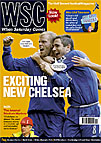 Few World Cup qualifiers can have been more politically charged than October's visit of Serbia & Montenegro to Bosnia-Herzegovina, as Djordje Nikolic reports
Few World Cup qualifiers can have been more politically charged than October's visit of Serbia & Montenegro to Bosnia-Herzegovina, as Djordje Nikolic reports
Nine years have passed since the end of the civil war in Bosnia-Herzegovina. Apparently it’s not long enough to hold a football game against the former compatriots, now neighbours, Serbia & Montenegro under normal conditions.
Major matches between Croatian and Yugoslavian sides in the Champions League and the Euro 2000 qualifiers have been staged with home support only. But away fans were to be allowed for this World Cup preliminary game in Sarajevo, with huge security measures to guarantee the safety of the visitors who turned up – fewer than a thousand in total. One of the “welcome” messages prepared by the home fans was a big banner which translates as “We have 250,000 reasons to hate you”, a reference to the death toll.
Controversy over the choice of venue had fuelled the pre-match tension. Bosnia wanted to play in the provincial town of Zenica, in a stadium that holds only 15,000, where they have never lost. Supporters in Sarajevo are not reckoned to be as passionate as in Zenica and some believe that the capital’s stadium, Kosevo, is cursed because during the war it had been used as a temporary graveyard – what once was a training pitch is now a cemetery. However, when Spain played in Zenica in September, Juan Carlos Valerón was hit on the head by a lighter thrown from the stands. The Bosnians had hoped to get away with a fine and a promise to install nets, but the Zenica stadium was closed for two games. The Serbian FA had sent a letter to UEFA raising their security concerns, leading Bosnians to wonder whether they had had some influence on the decision to switch venues. Both FAs insisted, though, that they had a good relationship and their respective heads made a point of embracing each other when the visitors landed at Sarajevo airport.
Needless to say, the atmosphere in the stadium was all but friendly. Before the match a TV reporter from Belgrade asked a Serbia fan if he expected trouble after the game. “With God’s help, I hope so,” he replied. Earlier in the day a Serbia FA official and one of the kitmen had left their hotel to go for a walk. In principle there was nothing wrong with this – about 50 journalists from Serbia & Montenegro had no problems at all during a two day stay in Sarajevo (there was even a five-a-side football game with their Bosnian counterparts). But the kitman went out in his team tracksuit, so the stroll ended with flight in a taxi from a group of locals.
On the way to the stadium one of the Serbia supporters’ buses was stoned. An hour before kick-off a group of Serbia fans raised a banner in the stadium reading “Srpsko Sarajevo” (“Serbian Sarajevo”), which was until recently the name of a part of the city. There was a scuffle when someone, a home fan or a steward, tried to take the banner down. The visitors’ national anthem was all but drowned out by booing; simultaneously home fans turned their backs on the pitch and raised their middle fingers. The Serbia fans followed suit when the Bosnia anthem was played and later chanted slogans in honour of Radovan Karadzic and Ratko Mladic, both indicted for war crimes.
Home fans threw stones taken from the dilapidated stands and other objects such as mobile phone batteries at the visitors’ players when they were about to take corners. After the game the Serbia team bus was hit with a stone, but no damage was done. As their fans were waiting to leave the stadium, though, a larger stone injured a Serbia supporter. In a touchline interview with a Belgrade journalist after the match, Serbia striker Marko Pantelic was praising the travelling supporters when a local fan in a Sarajevo FC shirt, who had got to the pitch apparently unnoticed by security, stood nearby and complained that “those were not Serbian fans, but fans from Bosnia cheering our opponents”. Pantelic replied that he didn’t care where they came from and repeated that they were great fans. “I wish you’d been killed,” the Bosnia fan retorted as Pantelic turned and headed for the dressing room.
The game itself was a goalless draw played in a good spirit with only two yellow cards. After the final whistle the players shook hands and swapped shirts.
“I have no doubts that on the field everything will be normal, just as in any other game. I’m sure the players won’t have any negative emotions. The fans, though, are another thing. It’s up to us to influence them,” the home coach Blaz Sliskovic, a Bosnian Croat, said a couple of days before the match. The game proved that for the time being a good atmosphere in such an encounter is, unfortunately, a pipe-dream.
From WSC 214 December 2004. What was happening this month